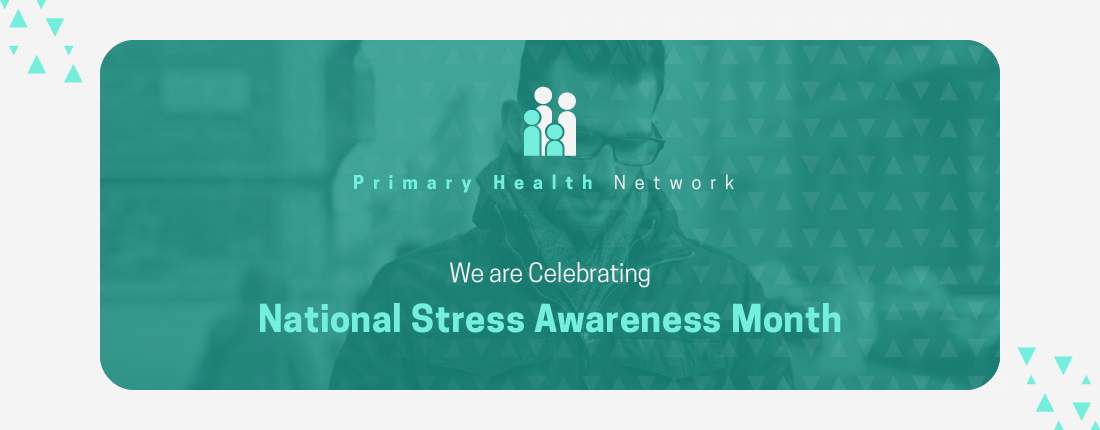Navigating the Noise in a Hyperconnected World
As we step into National Stress Awareness Month this April, it’s a time to pause, reflect, and take stock of how stress impacts our daily lives—physically, mentally, and emotionally. At Primary Health Network, we understand that stress can manifest in many ways and that it affects not only individuals but entire communities.
In today’s digital age, however, stress often comes from external sources we can’t easily control endless notifications, the constant stream of breaking news, and the never-ending pressure to keep up online. While technology connects us and makes life more convenient, it also exposes us to a barrage of negativity that can be overwhelming and draining.

Always Connected, Rarely Disconnected
Our screens have become extensions of ourselves. But with that connection comes an unintended cost:
- Doomscrolling: Constantly refreshing your feed for negative news can heighten anxiety and feelings of helplessness.
- Comparison Culture: Social media encourages a comparison game that can leave us feeling like we’re falling behind or not measuring up.
- Information Overload: We’re bombarded with more information in a single day than our grandparents might have encountered in their entire lives.
This constant exposure wears down our emotional resilience. The good news? Awareness is the first step toward change.
National Stress Awareness | Coping in the Age of Digital Overload
Here are some mindful strategies to help you stay grounded during National Stress Awareness Month—and beyond:
1. Set Boundaries with Technology
It’s important to create boundaries with your devices. Try implementing “phone-free” periods, especially during meals, before bed, and in the morning. This can help you start your day with calmness and intention, rather than diving straight into the chaos of the digital world.
2. Curate Your Social Media Feed
Not all content is created equal. Unfollow accounts that leave you feeling stressed or inadequate and seek out content that uplifts or inspires you. Follow health-focused pages, positive community groups, or accounts that promote mental well-being. The content you consume affects your mood so choose wisely.
3. Take Digital Detoxes
A break from screens can do wonders for your stress levels. Whether it’s for an hour or a full day, disconnecting from technology helps your mind reset and reduces information overload. Try scheduling regular tech-free days or taking breaks when you feel the need to recharge.
4. Balance Screen Time with Active Time
Our bodies were made for movement, and our minds were made for creation. Balance your digital consumption with activities that help release built-up tension. Take a walk, try yoga, practice deep breathing, or engage in a creative hobby—these activities help restore your mental equilibrium.
5. Connect In-Person or via Video
In-person conversations—whether face-to-face or via video—help foster a sense of real connection and reduce feelings of isolation. Don’t underestimate the power of human interaction to reduce stress. Whether it’s a chat with a family member, friend, or healthcare provider, meaningful connections are vital.
6. Mindful Media Consumption
You don’t have to be constantly “plugged in” to stay informed. Limit your news consumption to reliable sources and set specific times during the day to catch up. A steady stream of negative headlines can elevate stress levels, so be mindful of how much news you consume.
National Stress Awareness | Take Control of Your Well-Being
At Primary Health Network, we know that stress is a normal part of life but that doesn’t mean we should face it alone or let it take control. National Stress Awareness Month serves as a reminder that taking care of your mental health is just as important as taking care of your physical health. By managing your exposure to negativity, creating healthy boundaries with technology, and staying

If you are feeling overwhelmed or in crisis, please reach out to a trusted healthcare provider, or contact the National Suicide Prevention Lifeline at 1-800-273-8255 or text “HELLO” to 741741. You don’t have to navigate these feelings alone.
Remember, just because the world is always “on” doesn’t mean you have to be. Reconnect with yourself, your loved ones, and your health and give yourself permission to unplug.
Learn More About PHN
Learn more about Primary Health Network’s services by visiting our services page. Connect with our PHN Blog to learn more health tips and news or visit our Facebook & Instagram!
